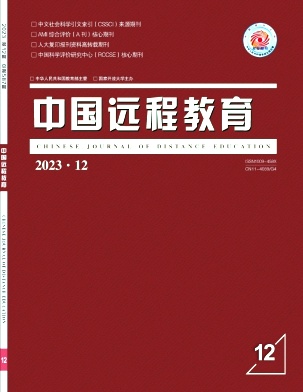
Contents
• The Local Experience and Theoretical Construction of Chinese Top-notch Innovative Talents’ Training System
• The Construction of the Growth Model of Top-notch Innovative Talents in China
• The Development of Smart Education Theory and Practice in China: A Ten-Year Review and Near-Future Prospects
• How Generative AI Reshapes Teaching Activities? Model Construction and Application Based on Activity Theory
• Ethical Reflection and Risk Elimination of Educational Technology in the Context of Digital Transformation
• How Social Media Affects Teenagers’Digital Reading Literacy?
• Catching up by Leaps and Bounds: Research on the Reform Direction of China’s Higher Vocational Education in the Intelligent Era
• Learning Empowers Role Construction of The Elderly: Scenarios and Practical Approaches
• The Historical Evolution, Theoretical Development, and Practical Logic of National Identity Education
• General Contents of Chinese Journal of Distance Education 2023
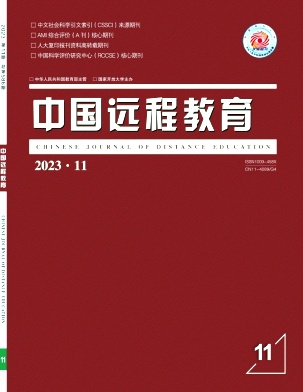
Contents
• Digital Transformation Boosting the Chinese Path to Educational Modernization: Inner Logic and Development Path
• Digitalization of Education Calls for Digital Pedagogy
• Educational Prompt Engineering: Constructing a New Epistemological Discourse in the Era of Digital Intelligence
• Research on Automatic Evaluation of Interaction Level of cMOOC Participants Based on Deep Learning
• How MOOC Platform’s Design Engage Students in Deeper Learning: Analysis Based on Persuasive Technology
• Design of Early Warning System for Online Learning Resource Evolution from the Perspective of High-quality Development
• The Construction of Regional Education Hub in Hong Kong Special Administrative Region: Strategies and Effects
• On the Three Basic Problems of National Conditions Education in the New Era

Contents
• Constructing a Powerful Nation of Education: Connotation, Challenges and Practical Pathways
• Pedagogy beyond Humanism? How Pedagogy Should Face the Post Humanism’s Technological Human Assumption
• Rethinking the Relationship between Higher Education and the Working World in the Context of Common Prosperity
• Are Those Involved in Information Technology Teacher Education Ready for the New Curriculum Standards? A Nationwide Survey Based on the Multi-Dimensional Perspective
• Deepening the Reform of Accurate Training for Teachers: Conceptual Model and Implementation Path
• The Shelter and Return of Humanistic Understanding: The Difficulty and Relief of Adolescents’Internet Addiction Intervention
• The Value Connotation and Realization Path of Rural Community Education under the Background of Rural Revitalization
• Classroom Participation Types and Their Generating Mechanisms in Ideological and Political Courses for Graduate Students: Relational Existence Theory Perspective
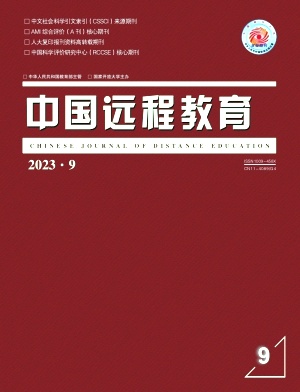
Contents
• The Essence, Core Issues and Pathways of Science Education
• What Kind of Philosophy of School Education Is Needed in the New Era: Concurrent Discussion on the Refinement and Expression of School-running Ideas in Primary and Secondary Schools
• The Human Dimension of School Aesthetic Education in the Age of AIGC Machine Creation
• The Structural Dilemma of the Implementation of th“e Double Reduction”Policy and its Relief: A Case Analysis Based on Urban Families’Participation in Education Reform
• Reform and Innovation of Education Supervision Model under the Background of Educational Digitalization Strategy: Based on the Construction Practice of the National Smart Education Supervision Platform
• The Value Logic and Practical Path of National Smart Education Platform Empowering High Quality and Balanced Development of Compulsory Education
• The Formation Mechanism of Information Technology Teacher Outflow Phenomenon: A Grounded Theory Study
• Institutional Support for the Construction of Open Universities in China and Japan: Historical Review and Comparative Reflection
• Value Consideration and Practical Approach of Moral Personality Development in the Age of Digital Intelligence
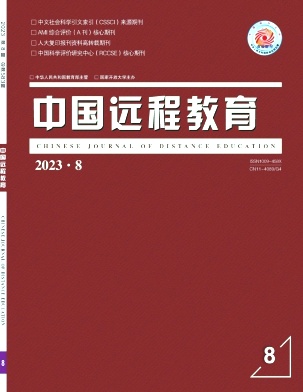
Contents
• Culture Casts the Soul: The Ideological Power of Chinese Path to Higher Education Modernization
• The Worldview of“Internet + Education”: Complex System View
• Precise Design of Effective Assignments Based on Cognitive Diagnosis
• Is Screen Reading Equivalent to Paper Reading? A Meta-analysis Based on 43 Experimental and Quasiexperimental Studies
• Government Governance Logic and Implementation Path of Textbook Construction Modernization
• How Effective are the Various After-school Services of the School? A Transnational Comparison Based on Education Quality and Equity Values
• The Course, Dilemma and Direction of After-school Service Multi-integration Promotion: Based on the Perspective of Principal-agent Theory
• Could the Education Offerings for the Older Adults Adapt to the Demands of the Aging Population? The Perspective of Coupling Between Supply and Demand
• Big Data Empowers Precise Ideological and Political Education: Operation Mechanism and Promotion Strategy
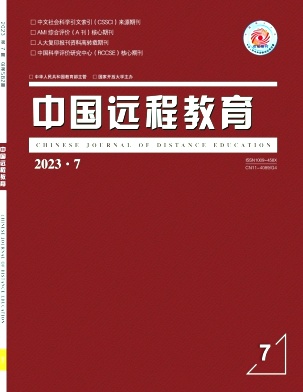
Contents
• The Traditional Foundation of Chinese Path to Educational Modernization: Historical Reflection and Spiritual Reconstruction
• Towards Liberation: Philosophical Reflection on the Essence of Application of Artificial Intelligence in Education
• Common Trends and Construction Emphasis: Global Insights of the Educational Digital Transformation
• Novel Intelligent Tutoring System Design and Its Key Technologies
• Artificial Intelligence Security Risks for Minors: Risk Clarification, Root Cause Analysis and Governance Approaches
• A Concept Analysis on Digital Literacy across Disciplines: A Method Based on Evolutionism
• Research on the Framework of Lifelong Education Platform under the Background of the Digital Education Strategic Action
• The Logic, Considerations and Path of Higher Vocational Ideological and Political Education in a Skill-based Society

Contents
• The Fundamentals of Chinese Path to Educational Modernization
• Education Digitalization:Transformation or Empowerment
• Digital Transformation and Integrative Development of Open Education: New Topics, New Ideas and New Actions
• Research on the Effects of Technostress on Teachers’Digital Teaching Innovation: Moderating Effects of Growt Mindset and TPACK
• Research on the Development Strategy of Smart Education Supervision Based on Needs Map Analysis: the Practice of National Smart Education Supervision Platform Construction
• Constructing a Standard Model of Project-Based Learning Pointing to the Development of Core Literacy for Chinese Students
• How to Develop Teachers’Digital Literacy: the Path of UNESCO and Its Inspiration
• Research on the Open University Conducting Social Education
• A Theoretical Exploration of the Public Image Shaping of Ideological and Political Education Courses in Colleges and Universities in the New Era

Contents
• Closure in Openness: the Education Crisis of Borderless Learning
• AI Reshapes the View of Knowledge: Knowledge Creation and Education Development under the Influence of Data Science
• The Motivation, Strategies and Actions of UNESCO in Promoting Information and Communications Technology in Education under“Education 2030”
• Design of Public Online Education Service Supply from the Perspective of Governance: Taking the Project of “Beijing Middle School Teachers Open Online Tutoring Plan” as an Example
• Research on the Instructional Interaction Law of Collaborative Problem Solving Based on Epistemic Network Analysis
• Research on the Obligation of Higher Education
• Spatial Logic of High-quality Development of Vocational Education in Chengdu-Chongqing Economic Circle
• Research on the Beautiful Spiritual Homeland and Its Construction on the Internet